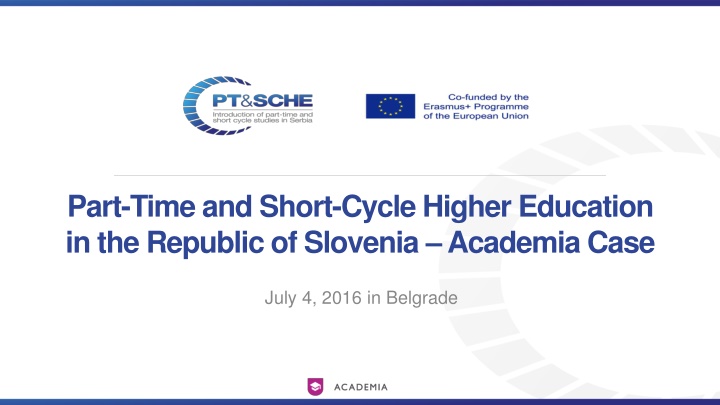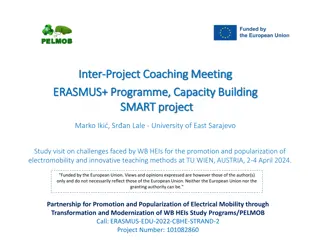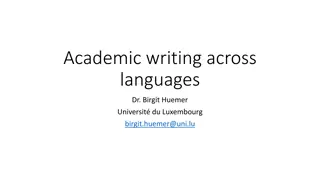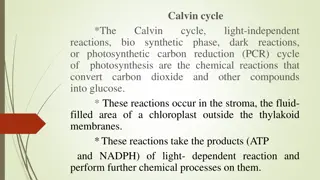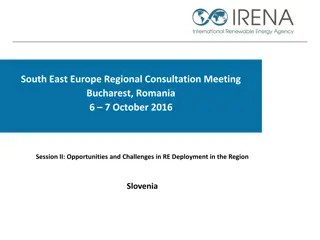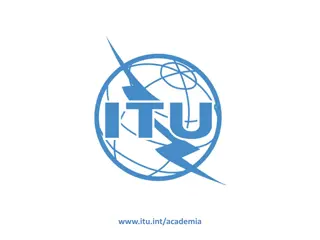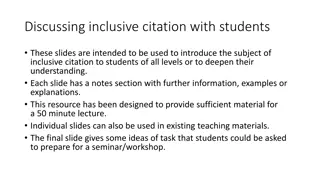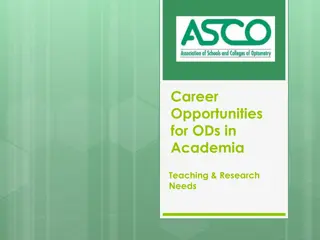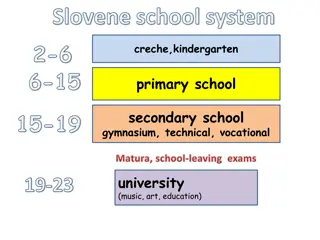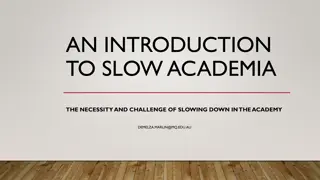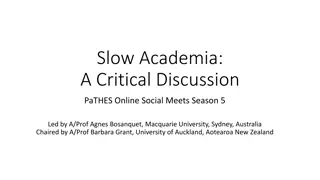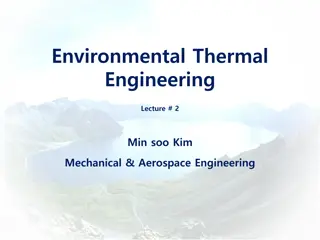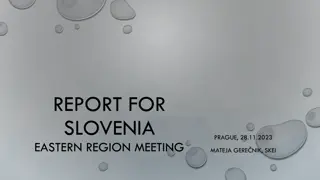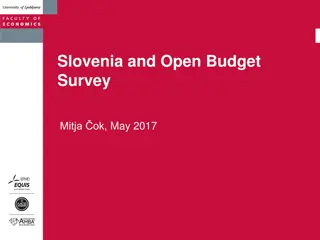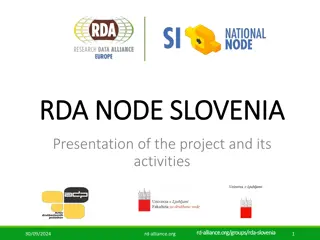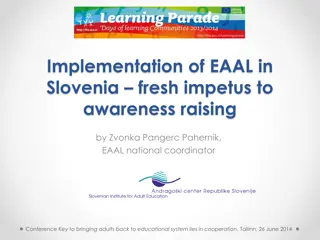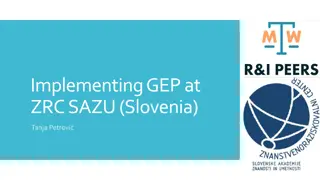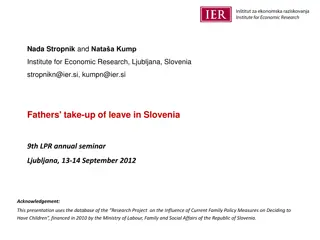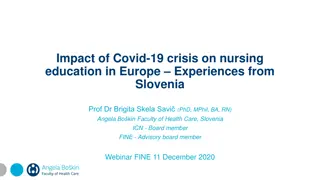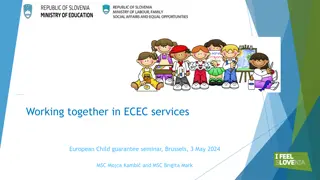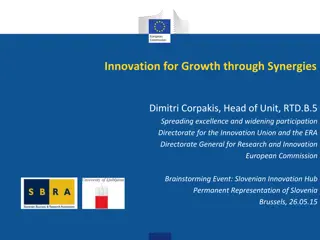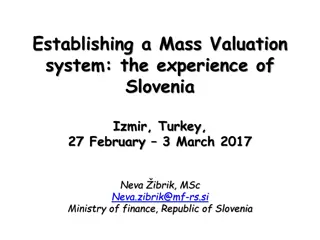Higher Education System in Slovenia: Part-Time and Short-Cycle Academia
Slovenia is actively involved in the Bologna process and is committed to establishing a high-quality tertiary education system. The country offers short-cycle higher education programs alongside traditional higher education, focusing on quality, employability, and mobility. With a rising number of tertiary education graduates, Slovenia's education system emphasizes professional competencies and offers diverse study opportunities.
Download Presentation

Please find below an Image/Link to download the presentation.
The content on the website is provided AS IS for your information and personal use only. It may not be sold, licensed, or shared on other websites without obtaining consent from the author.If you encounter any issues during the download, it is possible that the publisher has removed the file from their server.
You are allowed to download the files provided on this website for personal or commercial use, subject to the condition that they are used lawfully. All files are the property of their respective owners.
The content on the website is provided AS IS for your information and personal use only. It may not be sold, licensed, or shared on other websites without obtaining consent from the author.
E N D
Presentation Transcript
Part-Time and Short-Cycle Higher Education in the Republic of Slovenia Academia Case July 4, 2016 in Belgrade
Tertiary Education in Slovenia - Background Slovenia is actively involved in the Bologna process and as a member of the European Union committed itself to the objectives of the Lisbon Strategy. It aims to establish a high quality, diverse and accessible, as well as internationally comparable tertiary education system. Among the most important fundamental objectives of tertiary education are quality, employability and mobility in Europe and the world, fair access, diversity of institutions and study programmes. The tertiary education in Slovenia consists of short-cycle higher education and higher education. Both subsystems of tertiary education are interrelated in that they are linked by a system of quality assurance, students progression from lower to higher level education, and also partly by institutional and programme compatibility. Almost two-thirds of those who complete upper secondary education (typically at the age of 19) enrol in a tertiary education programme. According to Eurostat, Slovenia reached a specific objective of the Europe 2020 Strategy in 2013, namely 40% of people, aged 30 to 34 years had completed tertiary education. The percentage of the population who have completed tertiary education in Slovenia is constantly rising. In 2002, there were 215,000 tertiary education graduates (12.9 % of the population) over the age of 15; in 2011, the number rose to 308,000 (17.5 %) or one in six of people aged over the age of 15. Short-cycle higher education Short-cycle higher education is provided by 64 public and private colleges of short-cycle higher education. In the 2013/14 academic year, some 13,000 students attended. The practice-oriented programmes, which were developed to meet the needs of the economy, are of two years' duration. They provide students with professional competencies in accordance with professional standards. Graduates are trained for managing, planning and controlling work processes. Higher education Higher education is organized at public and private universities and independent higher education institutions. In the 2013/14 academic year, some 79,000 students were enrolled at faculties, art academies and higher education professional institutions. In the last decade, the number of higher education institutions has increased markedly. In 2013, there were three public and two private universities, one independent public higher education institution and forty-two private higher education institutions in Slovenia. The main tasks of higher education institutions scientific or artistic work, and education - are determined by law. Strategic objectives for individual five- to ten-year periods are determined by the national higher education programme adopted by the National Assembly of the Republic of Slovenia. Higher education is organized in three Bologna cycles. In this context, the first cycle features higher professional and academic undergraduate bachelor study programmes; the second-cycle features postgraduate master s study programmes (cycle or integrated), and the third-cycle includes doctoral study programmes. The introduction of the new Bologna study programmes at all levels of education was completed in the 2009/10 academic year. The old programmes have been withdrawn concurrently with the introduction of new programmes time frame to graduate from old programmes is until 2015/16. Study programmes are carried out as full-time or part-time or in the form of distance learning. Source: The EDUCATION system in the Republic of Slovenia / Ljubljana : Ministry of Education, Science and Sport of the Republic of Slovenia, 2015 2
Agenda Legal framework for Part-Time and Short-Cycle Higher Education Part-Time Higher Education Short-Cycle Higher Education and Colleges of SCHE Challenges Academia Case Appendix 3
Legal framework is fragmented into 2 Higher Edu Laws Ministry of Education, Science and Sport Higher Education Legislation Higher Education Act Regulation of Higher Education Regulation of Part-Time Studies Regulation of SCHE Level 6/II, Level 7 The Pre-School and Basic Education Directorate The Secondary, SCHE and Adult Education Directorate The Higher Education Directorate Short-Cycle Higher Education Legislation Short-Cycle Higher Education (SCHE) Act Regulation of Short-Cycle Higher Education Level 6/I Regulation of Part-Time SCHE SCHE Sector 27 26 25 Higher and Short-Cycle Higher Education in Slovenia ISCED-A 2011 5. SCHE - 550 6. First Cycle Academic 640 First Cycle Professional 650 7. Second Cycle 760 ECTS 120 180 180 120 24 23 Second Cycle (Masters) Second cycle integrated Masters 22 First cycle (academic) First cycle (professional) 21 20 SCHE 19 School / academic year 2014/15 and 2015/16 Kategorija 1 Kategorija 2 Kategorija 3 Kategorija 4 4
Fragmented HE Laws creates system variations Higher Education Legislation Short-Cycle Higher Education Legislation Higher Education Institution Accreditation and Reaccreditation (every 7 years) through Slovenian Quality Assurance Agency Study programme Accreditation and Reaccreditation (every 7 years) through Slovenian Quality Assurance Agency Study programmes owned by HE institution Most regulations are provided internally by HE institution e.g.: Regulation on lecturer appointment Regulation on examination / grading / recognition of prior knowledge Regulation on admission procedure Short-Cycle Higher Education enrolment as a citizen NO Ministry State Control autonomy of HE Institution SCHE Institution Accreditation through Ministry of Education, Science and Sport Reaccreditation every 5 years Study programme Accreditation through Ministry of Education, Science and Sport by Centre of RS of the Vocational Education Study programmes owned by Ministry of Education, Science and Sport any SCHE college may apply for implementation Most regulations are provided externally by Ministry of Education, Science and Sport e.g.: Regulation on lecturer appointment consensus from Ministry required Regulation on examination / grading / recognition of prior knowledge Regulation on admission procedure joint admission agency Ministry State Control Inspection regular every 5 years External reviews conducted by Slovenian Quality Assurance Agency every 7 years 5
Agenda Legal framework for Part-Time and Short-Cycle Higher Education Part-Time Higher Education and SCHE within HE Act Short-Cycle Higher Education, Colleges of SCHE and PT within SCHE Act Challenges Academia Case Appendix 6
Part-Time Higher Education is Not Heavily Regulated Article 37 of HE Act (Academic year and course load): The academic year runs from 1 October to 30 September. Graduate programs include a minimum of 20 and maximum of 30 hours of lectures, seminars and exercises per week and 30 weeks per year. If a study program includes practical training, the total student workload should not exceed 40 hours per week and 42 weeks per year. If the nature of the study makes it possible, notwithstanding the provisions of the first and second paragraphs of this Article, the curriculum can be adapted to the organization and schedule of lectures, seminars and exercises students opportunities (part-time). The adjustment is done in a manner and procedure determined by the statute of HE institution. Example of Statue from active HE Institution: Lectures and tutorials on part-time study are performed in 30% of total full-time study hours; laboratory, field and clinical work at least 75% of the entire study program. IN PRACTISE Sessions Twice Three times a Week 4.30pm 7.30pm Duration of part-time study is equal to full time-study Learning outcomes are expected to be equal between full-time and part-time studies Part-time study may be implemented partly or fully online including examination Part-time study is self-paid study Students are usually more motivated Students are usually employed, with professional experience in the field & level of a study programme 7
Part-time HE Strengths and Weaknesses Public HE Institution Students 2013/2014 Strengths 50000 Industry professionals may be appointed Lecturers Encouraging study environment by having motivated students due to the cost of education and their professional experiences Efficient content delivery through implementation of online support replacing broadcast lectures Quicker completion of studies Modular conduct of courses course after course 40000 30000 20000 10000 0 1st cycle programmes 2nd cycle programmes 3rd cycle programmes Weaknesses Weak regulation on part-time study programme execution lowering hours of lecturers, lab work and replacing with replacement with online studies to save HE institution costs No regulation for online studies monitoring examination, online-lab work etc. Achievement of equivalent learning outcomes to full-time students Lower criteria for study year progression: 20 ECTS out of 60 ECTS to enrol in 2nd year of part-time study compare to 45 ECTS out of 60 ECTS to enrol in 2ndyear of full- time study Student does not have to be employed or actively looking for employment to enrol into the part-time study programme, i.e. he is eligible for full-time study Full-time Part-time Private HE Institution Students 2013/2014 5000 4000 3000 2000 1000 0 1st cycle programmes 2nd cycle programmes 3rd cycle programmes Full-time Part-time 8
Short-Cycle Higher Education exists also within HE Act In practise the lever is used Admission as a Citizen Any citizen may join the study process as a citizen without enrolment into the study programme and HE Institution. HE Institutions regulate such admission in different manner: Mostly they require same entry requirements as those for full-time / part-time enrolment Citizens may join the study process within the academic year surpassing enrolment procedures Citizen may sit the examination After completed examination they receive a public document official HEI transcript with ECTS Citizens can not graduate without enrolment into a full-time or part-time study programme for enrolment of students without entry requirements into 1st, 2ndand 3rdcycle study programmes enrolling part-time students within the academic year Opportunities for HEI Promote SCHE programmes for industry within existing study programmes 9
Agenda Legal framework for Part-Time and Short-Cycle Higher Education Part-Time Higher Education and SCHE within HE Act Short-Cycle Higher Education, Colleges of SCHE and PT studies within SCHE Act Challenges Academia Case Appendix 10
SCHE in Slovenia is as well a regulated level of education Level 6/1 120 ECTS / 4 semesters 2-year study programme Curriculum: 20% lectures 40% lab. work 40% work-based learning Based on national qualification framework and industry demands 100% 90% 80% 70% % enrolled 60% 50% 40% 30% 20% 10% 0% 2004 6,765 29,146 2005 8,210 28,456 2006 8,280 27,178 2007 8,539 26,503 2008 8,763 26,251 2009 9,063 25,866 2010 8,251 23,411 2011 7,947 22,652 2012 7,315 21,097 2013 7,516 19,399 VS VIS 1. 2. 3. 4. 5. 6. 7. 8. 9. 10. Construction 11. Floristics / Horticulture Car-Service Management Bionics Economics Power Engineering Electronics Photography Terotechnology and Mining Hospitality and Tourism Forestry and Hunting 12. Informatics / Computer Science 13. Cosmetics 14. Wood Processing Technology 15. Logistics Engineering 16. Media Production 17. Mechatronics 18. Nature Protection 19. Design of Materials 20. Social Network Organizer 21. Business Secretary 22. Developing Visual Communication and Marketing 23. Mechanical Engineering 24. Telecommunications 25. Countryside and landscape management 26. Security Engineering 27. Environmental protection and sanitation 28. Wellness 29. Senior Police Officer 30. Food Technology and Nutrition 11
Part-Time SCHE Regulated on a National Level Instruction on SHCE study programme implementation adjustments for part-time students IN PRACTISE SCHE Institution Students 2013/2014 Sessions Twice Three times a Week 4.30pm 7.30pm Duration of part-time study is equal to full time-study Learning outcomes are expected to be equal between full-time and part-time studies Part-time study may be implemented partly or fully online including examination 70% of total hours is implemented for part-time students 9000 8000 7000 6000 5000 4000 3000 Part-time study is self-paid study Students are usually more motivated Students are usually employed, with professional experience in the field & level of a study programme 2000 80% of graduates are from part-time SCHE 1000 0 Public SCHE 7932 2416 Private SCHE 240 2614 Full-time Part-time Full-time Part-time 12
Short-Cycle Higher Education vs 1stCycle Higher Education Advantages of SCHE over 1stCycle HE (Academic and Professional) 1. Close and consistent cooperation with industries 40% of curriculum is work-based learning 400 hours of mentored and organised internship with SMEs or MNCs 2. Experiential learning Real-work assignment and projects 3. Curriculum developed by professionals based on industry needs 4. Greater employability 5. Greater P/F Ratio: 70% in SCHE vs 50% in HE 6. External control of implementation of study programmes State Control Inspection SCHE gains popularity since its establishment in 1996 100.0 80.0 60.0 40.0 Unemployment Rates in Slovenia 2015 20.0 National Average Youth SCHE Graduates 0.0 12% 20% 4.7% P/F Ratio: number of hours implemented in part-time study programmes / number of hours implemented in full-time study programmes 13
Agenda Legal framework for Part-Time and Short-Cycle Higher Education Part-Time Higher Education and SCHE within HE Act Short-Cycle Higher Education, Colleges of SCHE and PT studies within SCHE Act Challenges Academia Case Appendix 14
Challenges within PT Higher Education and SCHE 1. System anomalies due to the different legal basis and work organisation at the Ministry departments under different directorates Weak or no regulation on part-time studies allowing Colleges of SCHE and HEI to decide contact hours despite ECTS rules Question of Part-Time vs. Full-Time graduate learning outcomes due to the differences in contact hour and same year duration No regulation on online studies no control over online examination No framework for study programme quality control how programmes are actually implemented Heavy regulation of SCHE 6/1 level of Education Joint admission office ran at competitive College of SCHE Required consensus for lecturer appointment from Ministry commission members are principals and/or owners of competitive Colleges of SCHE Slow development of new study programmes or update of existing ones on average 5 years No legal basis for admissions as citizens to further promote SCHE within industries Financing of public and private Colleges of SCHE and HEI Some private Colleges of SCHE and HEI were granted concession unfair public and private competition Allowing graduates of vocational matura to enter 1stcycle academic and professional study programmes instead of directing them to SCHE first No clear separation of Academic and Professional Study Programmes (1stcycle) 2. 3. 4. 5. 6. 7. 8. 9. 15
Agenda Legal framework for Part-Time and Short-Cycle Higher Education Part-Time Higher Education and SCHE within HE Act Short-Cycle Higher Education, Colleges of SCHE and PT studies within SCHE Act Challenges Academia Case Appendix 16
Academia - Background Academia was founded in 1994, named As-Asistent at the time that combined language learning with travel abroad to escort high school students to UK during their summer break. As- Asistent s Language Travel program quickly spreads throughout Slovenia. In addition to offering English in England As-Asistent later launches new languages like German, French and Mandarin in more than 60 locations in 16 different countries around the world organizing Language Travel for more than 10.000 students. In addition to Language Travel programs abroad As-Asistent launches Language School in Slovenia, accredited by Ministry of Education of the Republic of Slovenia, offering Business English and German courses combined with University of Cambridge Exams as Corporate Trainings for Enterprises in Slovenia. For a decade As-Asistent organizes more than 50 tailored made programmes annually for large Slovenian corporations and organizations. In 1996 company launches Human Resource Agency and is granted a license from Ministry of Work, Family and Social Care of the Republic of Slovenia. In our job-seeking programmes over 5000 individuals joins over two decades. We are proud that more than 60% of participants secure a job throughout our programmes. In the same year company launches its own Student Work Agency, offering work opportunities for students. Over 10 years Academia As-Asistent offered more than 100.000 part-time jobs to more than 30.000 students in Slovenia. In 2004 company s Student Work Agency has merged with M-Servis to form the largest Student Work Agency in the country. As-Asistent launched a Research Project Unit in 1997 with a mission to work on industry research projects that would fuel the growth of the company. Company was entrusted a national project P-11: Human Resource Restructuring in Slovenian Enterprises and a national project Labour Market for Young Researches together with Young Research Society and Jo ef Stefan Institute. Research project unit launched three International PHARE Projects that lead to development of new Corporate Training Programmes: International Marketing with Communications, Computer Literacy, Professional Language Courses. In 2001, Academia enrols first generation of part-time students, who are already employed to the Business Commerce study programme. Academia becomes first educational organisation in Slovenia to introduce Standards of Quality in Education by ISO 9001:2000 standards. In 2003 Academia becomes affiliated with Higher College of Celje. Later renamed Faculty of Business and Commercial Sciences, becomes the largest Faculty in Slovenia in its fields of education. Year after, Academia develops its first E-Learning environment as a support environment with students. Today Academia is partnered with leaders in IT including Google, Adobe and Microsoft to offer students best learning experience online. In 2006 Academia founds its International Education Centre Maribor, where is now offering 12 different study programmes on SCHE, bachelor and master levels. 17
Academia College of Short Cycle Higher Education 75 000 participants in our programmes How we are different Appointed Lecturers are Industry Professionals 800 hours of lecturers and lab work 800 hours 100 days of organised and mentored internship Lecture recordings Strong online support with E-Academia Very high employability of our graduates Strong connections with study-programme related regional Enterprises and SMEs Provider of SCHE to the SMEs and MNCs Emphasis on generic competences in addition to subject-specific competences Face-Face Experiential Learning Minimum 4 out of 5 (80%) student satisfaction standard with lecturers Internal course implementation control Guest lecturers and Company Study Visits We not only meet students expectation, but we greatly and very greatly exceed students expectation to over 80% of students. 4 200 students since 2001 Leader in introducing and implementing standards of quality in Education SQAA Review 2008 Study Programme Offerings 1. Economist Commerce Accounting Tourism 2. Civil Engineering 3. Mechanical Engineering 4. Security Engineering 5. Media Production 80% our graduates receive their money back by getting promoted within 24 months, 50% within 12 months. http://www.academia.si/wp-content/themes/degordian/static/img/footer/logo-aa.gif http://www.academia.si/wp-content/themes/degordian/static/img/footer/logo-sl-exc.gif http://www.academia.si/wp-content/themes/degordian/static/img/footer/logo-siq.gif http://www.academia.si/wp-content/themes/degordian/static/img/footer/logo-iqnet.gif http://www.academia.si/wp-content/themes/degordian/static/img/footer/logo-ros.gif http://www.academia.si/wp-content/themes/degordian/static/img/footer/logo-pearson.gif http://www.academia.si/wp-content/themes/degordian/static/img/footer/logo-poki.gif http://www.academia.si/wp-content/themes/degordian/static/img/footer/logo-nakvis.gif 18
Academia uses live organisations for Lab Work MEDIA PRODUCTION MECHANICAL ENGINEERING CIVIL ENGINEERING SECURITY ENGINEERING 19
Selected SMEs and Enterprises Academia Works For 20
Agenda Legal framework for Part-Time and Short-Cycle Higher Education Part-Time Higher Education and SCHE within HE Act Short-Cycle Higher Education, Colleges of SCHE and PT studies within SCHE Act Challenges Academia Case Appendix 21
Contact Details Academia College of Short-Cycle Higher Education Glavni trg 17B SI-2000 Maribor www.academia.si info@academia.si Phone: +386 2 228 35 35 an Dap evi Head of Business Development zan.dapcevic@academia.si Phone: +386 2 228 35 34 22
Links Academia www.academia.si Ministry of Education, Science and Sport - www.mizs.gov.si Slovenian Quality Assurance Agency www.nakvis.si Association of Colleges of SCHE in Slovenia - www.skupnost-vss.si 23
